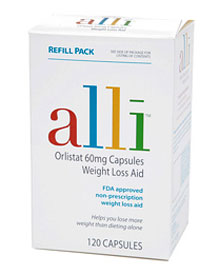GlaxoSmithKline, makers of the popular weight loss supplement Alli, are funding a documentary on the eating habits of Americans. They could also fund another documentary; this one on the industry of pirated drugs sold on the Internet… including their own Alli.
The counterfeit Alli looks a lot like the real Alli. But, the counterfeit pills are filled with sibutramine, not Orlistat – the main ingredient in authentic Alli.
The main difference between sibutramine and Orlistat is that the former is a substance that should not be used without a doctor’s oversight. Sibutramine is the active ingredient in the prescription weight loss drug Meridia. What’s worse, Alli is taken three times daily, while Meridia should only to be taken once a day.
So far, there is no word on the fake Alli making its way to brick and mortar retail outlets. According to GlaxoSmithKline, you can identify the fake, and potentially fatal, Alli by scoping out the following clues:
- The lot code is missing from the top of the box.
- The expiration date on the fake includes month, day, and year (e.g. 06162010). The authentic Alli’s expiration date includes only the month and year (e.g. 05/12).
- The seal on the bottle should read “Sealed For Your Protection” in white ink on GlaxoSmithKline’s Alli. This is not on the fake product.
- The capsule size is slightly larger in the counterfeit pills, and the contents of the capsules are powdery. The real Alli is shaped like a pellet.
If you think you have been sold a counterfeit version of Alli, you should call the Food & Drug Administration at (800) 551-3989 or go to this website.
(via: WebMD)
